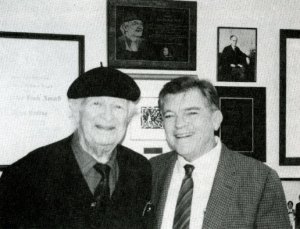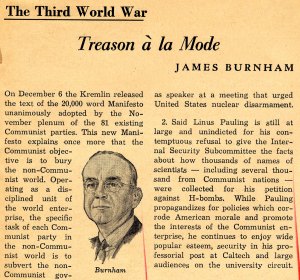
Pauling’s proposed chapter outline of “Fighting for Peace and Freedom,” October 31, 1960.
In 1960 Linus Pauling faced a severe test when he was called before two hearings held by the Senate Internal Security Subcommittee (SISS) and asked to provide a detailed account of the circulation of the United Nations bomb test petition that he and his wife, Ava Helen, sponsored in 1957 and 1958. The SISS subcommittee was similar in its purview to the more widely known House Un-American Activities Committee (HUAC), which had supported similar efforts in the past.
The Paulings’ petition started out in the United States as an “Appeal by American Scientists to the Government and Peoples of the World,” but as publicity grew, it found an international audience as well. The petition was submitted to the UN during the heart of the Cold War, and Pauling was called before SISS two years later because some committee members believed the petition to be in alignment with potential communist objectives, mostly because the document did not align with strategies being pursued by the United States military at the time.
Pauling was subpoenaed in June 1960 and, once seated before the committee, was asked to provide the names of all individuals who helped to circulate the bomb test petition across the globe. Pauling refused this request, believing that those who had provided their support to the petitioning effort should not be exposed to the same types of investigations that he was presently facing. Pauling was subpoenaed again in October of that year, and although he was threatened with contempt of Congress, once again he did not reveal the names of his colleagues. By this point, much of the mainstream media was beginning to lean in Pauling’s direction, and the SISS ultimately decided to back off its demands. And so it was that, after a very tense summer, Pauling wound up avoiding legal consequences.

Though he had managed to sidestep legal jeopardy, the SISS experience was an especially bitter one for Pauling. After the first hearing, Pauling was so angry that he briefly considered running for president, seeing no other viable corrective to what he viewed to be an absence of leadership in his country. While this idea quickly passed, Pauling was still moved to action, and during his participation in the second SISS hearing, he made a decision to write a book about his experiences in Congress. He would title it, Fighting for Peace and Freedom.
Pauling believed that his proposed book would be of interest to a wide readership and would also be a contribution to the public good. He detailed these sentiments in a book proposal that he addressed to August Frugé, director of the University of California Press, on October 4, 1960. In it, he wrote
I have formed the opinion that people are interested enough in it to be willing to read a book about it, and I plan to begin writing this book. The book will contain some background material about nuclear war, nuclear tests, the bomb-test petition, and the efforts that I have been making about these matters, and also it will contain an account of my hearing and of legal action in relation to the Internal Security Subcommittee.
Pauling also pointed out that there was precedence for a book of this sort. Specifically, he wanted to model his narrative after Philip Wittenberg’s 1957 publication, The Lamont Case: History of a Congressional Investigation, Corliss Lamont and the McCarthy Hearings, which chronicled Lamont’s appearance before Senator Joseph McCarthy’s Senate Permanent Subcommittee on Investigations.

Corliss Lamont
Lamont was an American philosopher and advocate of left-wing and civil liberties causes who frequently clashed with political figures and the CIA during his long life. He was called to testify at McCarthy’s infamous hearings in 1953, during which he denied ever being a Communist, but refused to get into specifics, citing the legal protections provided by the Fifth Amendment to the U.S. Constitution. The legal proceedings that arose from his hearing dragged on for two more years and, though Lamont was never formally identified as a communist, he continued to butt heads with the government for several years following.
Using Wittenberg’s book as his model, Pauling proposed that Fighting for Peace and Freedom consist of twelve chapters that would describe the case, present legal documents and a complete transcript of the two hearings, and also include several contextual chapters relating to the whole affair. Pauling felt that it would be useful for readers to have easy access to all this information and, indeed, that it should be made readily available to the public.
The twelve chapter titles that Pauling put forward were as follows:
- The Life of a Scientist
- The Bomb-Test Petition
- The Senate Internal Security Subcommittee
- My First Hearing—Morning Session
- My First Hearing—Afternoon Session
- I Go to Court
- News Accounts, Editorials, and Advertisements
- My Second Hearing—Morning Session
- My Second Hearing—Afternoon Session
- Senator Dodd’s Crusade
- Misuse of Power by Congressional Committees
- Peace, Freedom, and Morality
In its proposed form, the book would be lengthy – Pauling put the estimate at about 440 pages, of which roughly 80 would be appendices. However, he believed he could potentially trim the project down by 10% if need be, without loss of coherence in his argument. Despite the length of the text and his unrelenting schedule, Pauling hoped to have the manuscript ready to go as soon as possible and aimed to have copy ready to be set in type by December 13, 1960.
Pauling also took pains to point out that Fighting for Peace and Freedom was not going to be a scholarly study; rather, it would be written in an intimate and personal manner. Furthermore, as Pauling explained to the University of California Press’ Los Angeles editor, Robert Y. Zachary, the writing would be “restrained, and perhaps even to make use occasionally of understatements.” Zachary and August Frugé, director of the press, were both interested in the project and looked forward to reading the manuscript once Pauling had it completed.
As it turned out, California was not the only press that was interested in pursuing Pauling’s newest book. Pauling also approached Cornell, a university press with a known predilection for printing works that dealt with issues concerning civil rights. Cornell, which had also published Pauling’s monumental Nature of the Chemical Bond beginning in 1939, was also interested in reading the manuscript when it was ready.
Despite these favorable responses and his own initial vigor in pursuing the project, Pauling never completed the manuscript; indeed, there is no indication that he ever even started it. There is no obvious indication as to what happened, although it would seem likely that the very cluttered nature of his calendar halted any momentum in its tracks. Pauling’s letter to Zachary was mailed on November 2, 1960 and proposed a December 13 deadline. During that span of less than one and a half months, Pauling made trips to Ohio, New York, New Jersey, Kansas, Colorado, Missouri, Washington, British Columbia, and Illinois.
Amidst this heavy press of work, one might suppose that, just as with his aborted interest in pursuing the presidency, Pauling’s zest for writing the book started to flag, and by the end of the year, the story of Pauling’s appearance before the SISS had increasingly become old news. As such, it remains for us today to continue wondering exactly how he would have characterized his Congressional hearings in the larger fight for peace and freedom.
Filed under: Peace Activism | Tagged: Corliss Lamont, Fighting for Peace and Freedom, Linus Pauling, Senate Internal Security Subcommittee, United Nations Bomb Test Petition | Leave a comment »
































